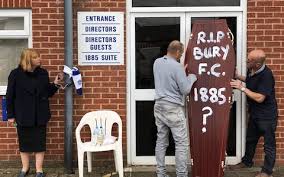By Andrew Warshaw
August 28 – In what will go down as one of the darkest days in recent English football history, Bury, one of the country’s oldest clubs, were expelled from the Football League (EFL) on Tuesday after failing to resolve their financial problems, the first English club to go out of business for 27 years.
Bury owner Steve Dale had informed the EFL last weekend that he had accepted an offer from C&N, a data and analytics company, but they pulled out of a proposed takeover of the League One (third-tier) side just a few hours before a deadline to prove they could pay off creditors and had the funding to last the season.
Bury, based near Manchester in one of English football’s heartlands, joined the Football League in 1894, nine years after they were founded, and won the FA Cup in 1900 and 1903. They are the first team to be expelled since Maidstone in 1992.
“We did absolutely everything we could to try and get everything in place to try and make sure the takeover went through,” said C and N joint founder Henry Newman.
“Ultimately though, it was six years of a combination of financial mismanagement, errors in governance and issues that ultimately meant that to unravel them, in what was a short period of time, were incredibly difficult.”
Media reports suggested at least three 11th-hour offers had been submitted but with five fixtures already postponed, the league decided no more time could be bought, leaving loyal Bury fans devastated at seeing their club plunged into oblivion after 134 years.
Although Bury, who had already been deducted 12 points, had not been in the top flight since 1929, they were in the second tier Championship as recently as 1999 and actually won promotion to League One at the end of last season. But just four months later, television pictures showed shocked fans in tears at the club’s sudden demise.
In a statement the Football League attempted to explain its reasoning.
“Having fully considered all available options, including a number of late expressions of interest provided to the EFL, the EFL Board has unanimously determined with enormous regret that Bury’s membership be withdrawn,” the statement said.
“The EFL Board had maintained that there could be no further suspensions to the fixture list and that these ongoing concerns and the integrity of the competition were a significant factor in the decision.”
Debbie Jevans, EFL Executive Chair, added: “Today is undoubtedly one of the darkest days in the League’s recent history. The EFL has worked determinedly and tirelessly to avoid this outcome and it is with a heavy heart that this situation has been forced upon us.
“No one wanted to be in this position but following repeated missed deadlines, the suspension of five League fixtures, in addition to not receiving the evidence we required in regard to financial commitments and a possible takeover not materialising; the EFL Board has been forced to take the most difficult of decisions.”
Bolton given two-week breathing space
In a separate decision, the EFL ruled that Bolton Wanderers, an even bigger club with a large fan base and iconic history but with similar financial problems, had been given a 14-day extension to resolve their situation or face the same outcome. Bolton were in the Premier League as recently as seven years ago and are in grave danger of becoming the biggest ever name to disappear from the landscape.
Bury’s overnight liquidation immediately rekindled the debate over the state of English football in terms of the gap between the haves and have-nots and the fact that the domestic game has 92 professional clubs spread across four divisions, all vying to be successful.
“The real issue is most football clubs at the lower levels are paying too much for the players,” former English FA chairman Gred Dyke was quoted as saying. “What is remarkable is that this doesn’t happen more often.
“In the end if you’re paying so much to buy players or for their wages and you’re not getting that sort of money in, it’s not a business at all is it? Whether the Football League has got the nerve to bring in wage caps and all those sorts of things will be interesting.”
See: David Owen: Don’t bury Bury
Contact the writer of this story at moc.l1745177818labto1745177818ofdlr1745177818owedi1745177818sni@w1745177818ahsra1745177818w.wer1745177818dna1745177818

